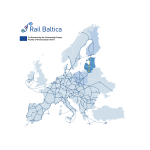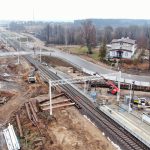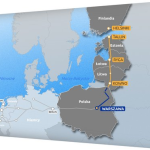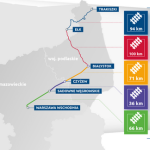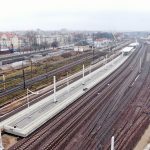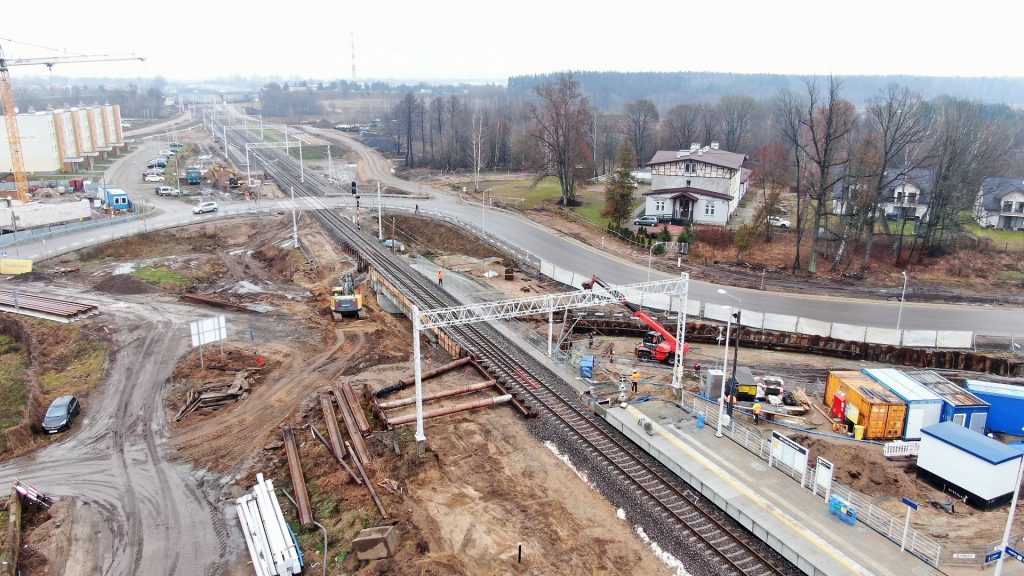 RB Rail AS, PKP Polskie Linie Kolejowe and LTG Infra signed a tripartite letter of intent on the implementation of Rail Baltica corridor at the Polish-Lithuanian cross-border rail section at technical and operational levels.
RB Rail AS, PKP Polskie Linie Kolejowe and LTG Infra signed a tripartite letter of intent on the implementation of Rail Baltica corridor at the Polish-Lithuanian cross-border rail section at technical and operational levels.
The Polish rail infrastructure manager is responsible for ensuring the infrastructure development on the Polish side, and the signed agreement is an expression of the will of all stakeholders in the project to continue cooperation in building the missing rail link of the North Sea-Baltic TEN-T Core Network Corridor thus ensuring full integration of the three Baltic States into the single European railway area and developing a new economic and security corridor.
“The implementation of Rail Baltica global project section from Kaunas to Polish / Lithuanian border is progressing well, and after selection of the route alignment last year, is now entering the design phase. At the same time, we appreciate and welcome the progress in implementation of Rail Baltica project on the Polish section.” Karolis Sankovski, CEO of LTG Infra said.
The signed letter of intent foresees cooperation of Rail Baltica project partners on matters including striving to achieve consistency between railway infrastructure design reference documents, interface with the energy subsystem architecture at the interface between the boundary components of the energy subsystem, and interface with command-control and signalling subsystems.
“Our cooperation with Poland goes way back, and now, when the project has reached maturity of entering large-scale construction, harmonization of common standards and technical requirements not only within the Baltics, but also on the cross-border section with Poland becomes an even greater priority,” said Agnis Driksna, Chairperson of the Management Board and CEO at RB Rail AS.
“Cooperation and exchange of experience are extremely important for enhancing the quality of rail traffic on cross-border sections. Our activities will be reflected in improving the quality of railway communication between Poland and Lithuania. Rail, the greenest means of transport, will increasingly play a key role in international transport,” said Ireneusz Merchel, President of the Management Board of PKP Polskie Linie Kolejowe.
To ensure the rapid implementation of Polish-Lithuanian cross-border rail section, in May 2022, Lithuania’s Ministry of Transport approved the optimal route alternative of the Rail Baltica connection from Jiesia, a suburb of Kaunas to the border with Poland. The optimal route of Rail Baltica between Kaunas and the border with Poland was chosen to be alternative 6A, according to which a new 1,435 mm railway track is planned to be built in a place where there was no railway track altogether. The main railway line will bypass the city of Marijampolė, south of Lithuania, bordering Poland, move away from the city of Kazlų Rūda (27 km north from Marijampolė), and will not encroach on Kalvarija (in Marijampolė County). Regional stations are planned in Marijampolė and Šeštokai, which will be connected to the main railway line by regional connections.
Thus, the journey from Jiesia to the border with Poland is expected to take up to 19 minutes. Upon completion of construction of Rail Baltica, the journey from Kaunas to Warsaw will take 3.5 hours, and reaching the Polish capital from Vilnius will only take a little more than 4 hours.
The modernisation of the Rail Baltica connection in Poland is divided into five stages and is carried out on several rail sections. PKP PLK has completed the modernisation of Warsaw Rembertów – Sadowne and Sadowne – Czyżewo sections and currently works are carried out on the third 71 km section from Czyżew to Białystok. The plans include construction or modernization of 6 stations, 12 stops and 10 railway bridges, and a new local traffic control centre in Białystok.
Construction and modernisation works are planned on the 100 km Białystok – Ełk section and on the 94 km Ełk – Trakiszki sections situated on the E75 railway line. The completion of the works on the route from Warsaw to Tallinn is scheduled for 2026. Thanks to the implementation of the works, the travel time on the Polish section of Rail Baltica will be shortened. Passenger trains will run up to 160 km/h, and freight trains up to 120 km/h, which means that the journey from Białystok to Warsaw will take less than 2 hours
PKP PLK is also reconstructing the tracks at Ełk station which will ensure the connection to Lithuania through the E75 railway line on the Białystok–Suwałki–Trakiszki (state border) route.
Due to the investment, in Ełk, the passenger and freight stations are changing. The contractor laid several kilometers of tracks and is working to build new facilities. Platforms, tracks and railway traffic control devices are being reconstructed.
At the Ełk station, the contractor is finishing the construction of platform no. 3. Information boards and benches as well as energy-saving LED lighting will be installed. To facilitate communication through the station area, an underground passage has been made available to a limited extent next to the work site. Once completed, the tunnel will provide convenient access to the new platforms and a passageway between the two parts of the city. Elevators and special markings will facilitate communication for people with reduced mobility. In addition, the contractor started work on the opposite side of the tracks.
Work is also progressing on the construction of two-level intersections of roads with tracks as well as the necessary viaducts that will replace the existing level crossings. PLK is also constructing a new bridge over the Ełk River.
The Polish-Lithuanian cross-border rail connection is implemented through the “Works on the E 75 railway line, section Białystok – Suwałki – Trakiszki (state border), stage I, section Białystok – Ełk” project which is expected to be completed this year. PLN 587 million (EUR 123.76 million) is the value of the investment for which Poland received a CEF co-financing of EUR 142.1 million out of the EUR 167.2 million eligible costs.
Share on:



